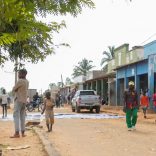Mozambican navy accused of failing to rescue research vessel attacked by terrorists - AIM report | ...
Mozambique: Authorities tighten precautions against illegal immigration, trafficking in persons

The Mozambican government has approved a decree that provides for greater control over who crosses the country’s borders.
From now on foreign minors entering Mozambique accompanied by any adult or a single parent will only be able to do so only with an authorisation recognised by the notary. If not accompanied by the parents, the child will need the authorisation of both, recognised by a notary.
According to government spokesman Augusto Fernando, the purpose of the law is “to impose measures in relation to the fight against illegal immigration and trafficking in human beings”.
The new law also provides measures for cases in which a citizen is refused entry to the country for not meeting the conditions required by law, added Augusto Fernando.
“One of the innovations contemplated by the law is that in case of refusal of entry of the citizen (by the authorities), the carrier is obliged to bear all the costs of repatriation.”
Revision of the 1993 law
The Mozambican government spokesman justified the approval of the new law stating that “in the end, the law is being revised taking into account our experience since it was approved in 1993, allied to the regional, continental and international dynamics”.
Mozambique does not have a reliable database on the number of illegal immigrants, but statistics from the Mozambican National Migration Service indicate that more than 1,300 were repatriated in the first half of this year alone. Of this number, 68% were persons whose legal period of stay in the country had expired.
Mozambique “is a safe country”
A World Food Program (WFP) delegation has said that the country needs policies to reduce the burden of immigration on the local population. According to the WFP, Mozambique has become a “safe country” for immigrants , hosting more than 20,000 refugees in 2017.
In addition, thousands of immigrants try to cross Mozambique on their way to South Africa in search of better living conditions.
A study commissioned by the Office of the Attorney General notes that the repatriation of illegal immigrants as well as detention in police stations and accommodation centres has high costs for the state.
Figures indicate that only last year the state spent about 13 million meticais on repatriation operations, equivalent to about 185,000 Euros.

Illegal immigration and trafficking in persons
The authorities argue that the new law will combat not only illegal immigration but also trafficking in persons. Mozambique is known to be a preferred corridor for international trafficking networks.
This trafficking moves people for the purpose of forced labour, illegal exploitation and prostitution, etcetera, and may even include the harvesting of human organs.
According to Attorney General Beatriz Buchili, “it is estimated that 10.5% of the trafficking of persons in Mozambique is aimed at sexual exploitation, and 89.5% at the extraction of human organs or forced labour”.












Leave a Reply
Be the First to Comment!
You must be logged in to post a comment.
You must be logged in to post a comment.